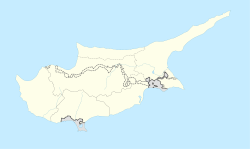| Troodos Station | |
|---|---|
| Part of Strategic Command | |
| Troodos Mountains in Cyprus | |
 | |
| Site information | |
| Type | Signals intelligence gathering and radar station |
| Owner | Ministry of Defence |
| Operator | Strategic Command |
| Controlled by | British Forces Cyprus |
| Location | |
| Coordinates | 34°54′46″N032°53′02″E / 34.91278°N 32.88389°E |
| Area | 50 hectares |
| Site history | |
| Built | 1878 |
| In use | 1878–present |
| Garrison information | |
| Occupants | Golf Section, Joint Service Signal Unit (Cyprus) |
Troodos Station, formerly Royal Air Force Troodos, is a retained British Strategic Command site in the Republic of Cyprus.
Contents
Troodos Station is a remote Signals Station operated by personnel from Golf Section, Joint Service Signal Unit (Cyprus). The station parents the Mount Olympus radar site, operated by a small contingent of RAF personnel. [1]
The station is based deep within the Troodos Mountains, approximately 14 miles (23 km) north of Episkopi.
